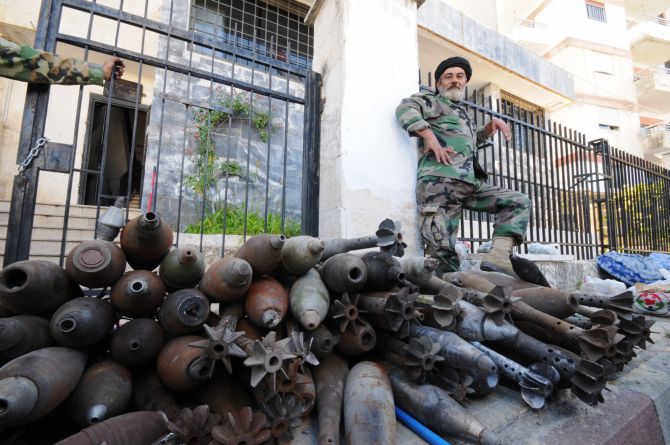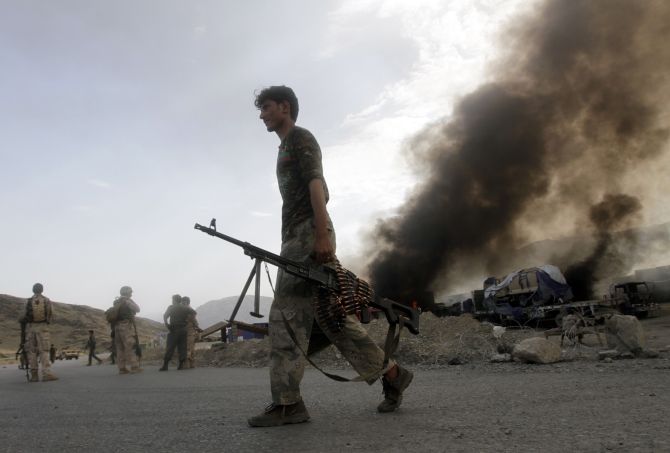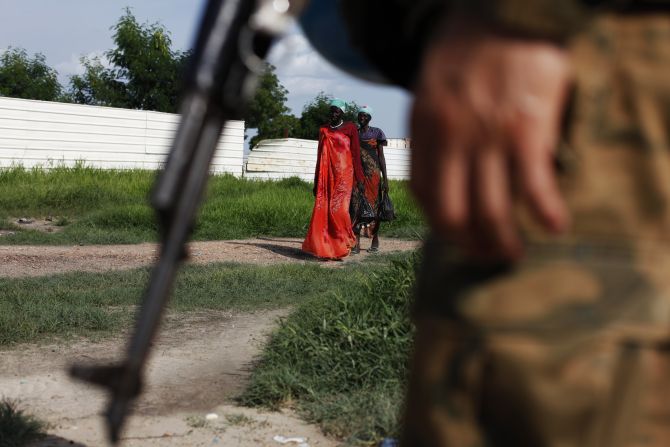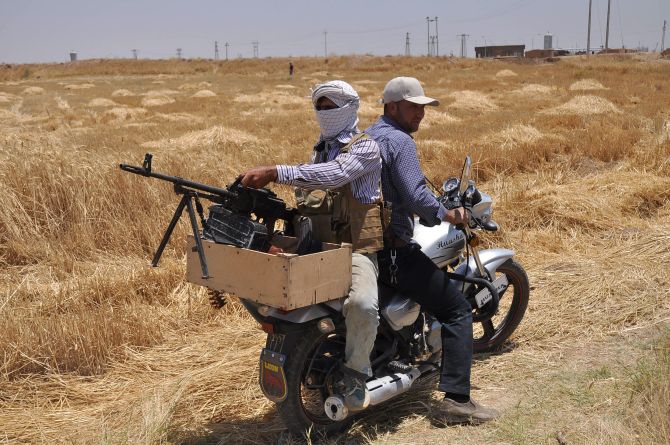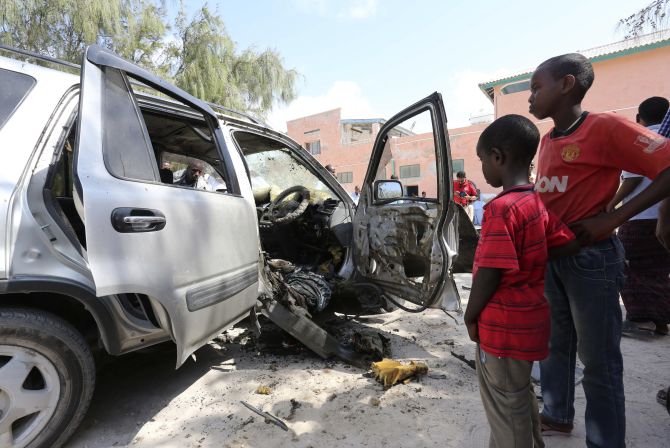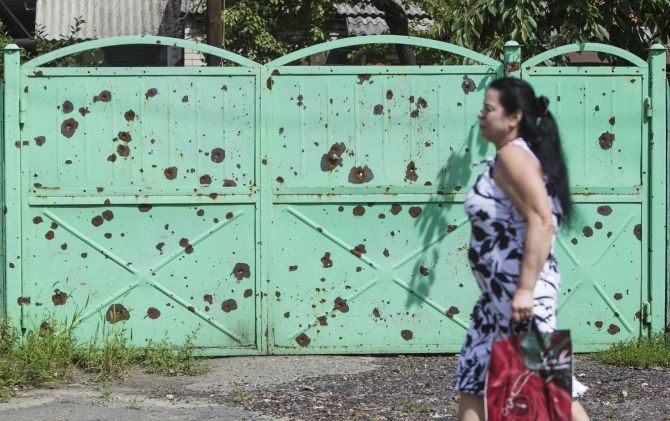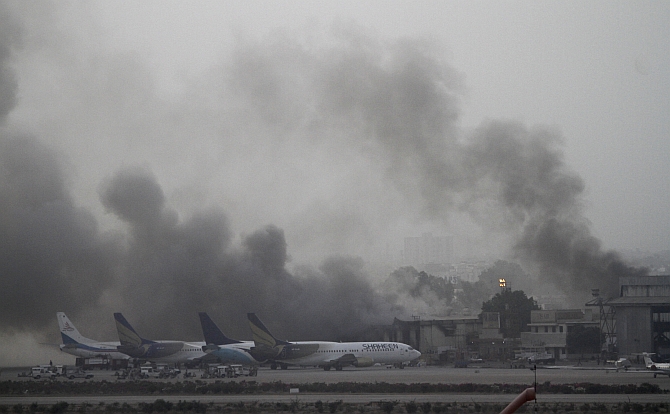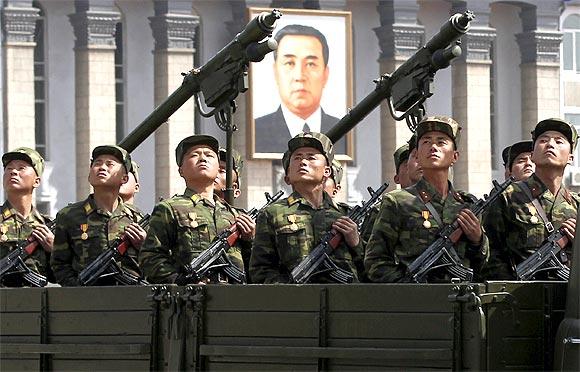 | « Back to article | Print this article |
The world's MOST VIOLENT nations
In the latest annual ranking of Global Peace Index states that 500 million people live in countries at risk of instability and conflict. India has been ranked at 143rd position out of 162 countries surveyed.
According to the GPI, the ten most peaceful countries, in order, from 2013 to 2014 were Iceland, Denmark, Austria, New Zealand, Switzerland, Finland, Canada, Japan, Belgium, and Norway. The most violent countries were Syria, Afghanistan, South Sudan, Iraq, Somalia, Sudan, Central African Republic, Democratic Republic of the Congo, Pakistan, and North Korea.
The economic impact of containing and dealing with the consequences of violence in 2013 was significant, amounting to US$9.8 trillion per annum, an increase of $179 billion from 2012.
Here are the world’s least peaceful countries
Click NEXT to read more…
Syria
Syria has swapped places with previously bottom ranked Afghanistan and now appears as the least peaceful country in the world, according to the 2014 Global Peace Index.
Over the past year, the Syrian civil war intensified to new heights of violence and bloodshed, with an estimate of around 100,000 persons killed since the fighting erupted in 2011, and millions displaced.
The most significant event was the chemical attack by government forces in a suburb of Damascus, that left hundreds dead and resulted in strong international condemnation and, almost, to intervention by Western forces. This was only averted after a last-minute deal, sponsored by Russia, to disarm the Syrian government of its chemical-weapons capabilities, to which it has mostly complied and, hence, has resulted in a slight boost to the score.
The civil war intensified in its third year, amid a bloody stalemate between government forces loyal to the president, Bashar al-Assad, and the numerous rebel groups fighting against it. Syria saw some of its categories reach the highest score (5), including those related to refugees and displaced persons (estimated at over one-third of the population), ease of access to small arms and light weapons, and overall level of violent crime.
Click NEXT to read more…
Afghanistan
The largest improvement was seen in what nevertheless remains the world’s most violent region, South Asia, which includes Afghanistan.
According to GPI, the main cause for Afghanistan’s score change was a rise in military expenditure as a percentage of GDP, which, at 13.8 percent, is high by global standards, but reflects a process of rearmament by the government in order gradually to take a greater share of security responsibilities from NATO-led ISAF forces.
The recent elections, of which a first round of voting proceeded without major incident in early April, offer some hope that political stability may improve over the next few years. Despite this, its overall score improved and it was replaced by Syria at the bottom of the global rankings.
Political terror decreased especially in the South Asia and the Middle East and North Africa regions with the most significant improvements in Afghanistan, Nepal, Sri Lanka, Yemen, Libya, Egypt and Algeria.
Click NEXT to read more…
South Sudan
South Sudan suffered by far the sharpest deterioration in the 2014 GPI.
The number of internal and external conflicts fought increased, particularly in sub-Saharan Africa with the largest increases recorded for South Sudan and Uganda.
South Sudan, the world’s newest sovereign state, witnessed a major outbreak of violence in late 2013 that continues to this day, brought about by an uprising against the government by the Sudan People’s Liberation Army. The conflict has also drawn in Ugandan forces in support of the government.
South Sudan experienced the largest drop in the Index this year falling from 145th to 160th and ranking as the third least peaceful country. Major deteriorations also occurred in Egypt, Ukraine and Central African Republic, the report states.
South Sudan’s score was affected by the sudden outbreak of violence that followed opposition leader, Riek Machar, and his supporters’ taking up arms against the government in December 2013. The South Sudanese conflict has a clear ethnic dimension, as shown by the support given by the Nuer minority to the rebels, while the government is backed by the Dinka majority. According to data, around 5,000 people have since been killed in the fighting and possibly as many as one million have been displaced.
Click NEXT to read more…
Iraq
Countries that became less peaceful over the past year included Iraq (partly due to an increase in internal violence, but also due to the ongoing build-up of its armed forces under US auspices).
While the majority of the increase in terrorist activity can be attributed to Iraq, Afghanistan, Pakistan and Nigeria their scores did not increase greatly as these countries were already at or near the highest possible score.
One of the more disturbing trends to gain momentum since the start of the Iraq war is terrorist activity. According to the Global Terrorism Database the number of deaths from terrorist activity increased globally from over 3,800 in 2002, to over 11,000 in 2012 and up to an estimated 17,800 in 2013.
The most powerful illustration of the link between violence and economic prosperity can be seen when a nation experiences outright conflict and in the worst-case scenario, civil war. There are many prominent examples from the long revolutionary period in Nicaragua from the 1950s to 1990s, to civil war in El Salvador from 1979 to 1991 and more recently in Afghanistan and Iraq where economic progress has been set back for many years, the GPI reports states.
Click NEXT to read more…
Somalia
Global peace was negatively affected by a number of international events including deteriorations in peace in Somalia, DRC and Rwanda; and violent demonstrations associated with the economic downturn in a number of European countries.
Burundi also saw an improvement in its score as a result of a lower number of refugees and displaced persons, a category that now has the lowest (best) possible score. However, it saw a rise in the number of external and internal conflicts fought due to its involvement in fighting Al-Shabaab in Somalia.
Djibouti’s attempts to play a stabilising role in Somalia has included hosting UN-sponsored Somali reconciliation talks in 2008-09 and contributing troops to the African Union Mission in Somalia (Amisom) since 2011.
The government’s role in Somalia inevitably brings attendant security risks, but Djibouti’s reputation for peace and political stability has nourished its strategic importance in the region, politically as host to foreign military facilities belonging to the US, France and others, and commercially as a key hub for trade, both regionally and globally
Click NEXT to read more…
Central African Republic
The Central African Republic was also gripped with internal conflict that saw it slip to 156th rank.
The Central African Republic was one of many in the sub-Saharan Africa region to suffer from sectarian conflict, resulting in a deterioration of peace. Already one of the least peaceful countries in the Index, the CAR suffered a major outbreak of violence, beginning in December 2012 as a rebel army from the mostly Muslim Séléka coalition marched towards the capital and had taken control of the government by March.
However, the campaign was marked by extensive human-rights abuses, as well as hundreds of thousands of internally displaced people. Fighting between different groups has continued since, however, amid claims of genocide and ethnic cleansing that eventually triggered a French intervention.
As a result, the CAR now scores the highest (worst) in terms of its relations with neighbouring countries, as well as in the number of refugees and displaced people.
Additionally, continued political unrest has also led to a high likelihood of violent demonstrations. Sharp divisions between the country’s Muslims and Christians, amid accusations of atrocities committed by both sides, highlight the fragile state of peace in this country.
Click NEXT to read more…
Russia
Russia remained the least peaceful country in the region and one of the worst performers globally, ranking 152nd.
The key event in the region was the crisis between Russia and Ukraine, which was sparked by the Euromaidan protests and led to the removal of the Yanukovych government in late February followed by the subsequent Russian occupation and annexation of the Crimea in March. This caused both Ukraine and Russia’s performance in domestic and internationals conflict to tumble, although Russia’s overall score was offset by improvements in the number of security officers and police, number of homicides, number of external and internal conflicts fought and, to a lesser extent, terrorist activity.
Click NEXT to read more…
Pakistan
Pakistan ranks 154th on the Global Peace Index.
Pakistan minority groups Shia, Ahmadi, and Christians faced unprecedented insecurity and persecution in the country.
Whilst only 28 countries were affected by deaths from terrorism in 2002, in 2013 this more than doubled to 59 countries. Given the recent surge in terrorist activity in Iraq, Pakistan, Nigeria and Syria it is unlikely this trend will end soon.
More countries increased their weapon imports than decreased with 40 countries increasing their level of imports per 100,000 from the 2008 to 2014 GPI and ten countries decreasing their level of imports. According to the GPI data, the biggest increases occurred in India, the UAE, Pakistan and Algeria.
Among those blamed for the sectarian violence in the country are mainly Sunni militant groups, such as the Lashkar-e-Jhangvi, Sipah-e-Sahaba, Tehrik-i-Taliban Pakistan.
Click NEXT to read more…
North Korea
North Korea ranks 153rd on the Global Peace Index. On the whole, the Asia-Pacific rankings changed little from last year, and continued to see the countries of the Indochina sub-region, as well as North Korea, at the bottom.
Whilst all the countries that place in the bottom five for Societal Safety and Security and Ongoing Conflict are either from Sub-Saharan Africa or the Middle East and North Africa, the Militarisation sub-domain features four countries from outside these regions: Israel, North Korea, Russia and the United States.
Of these, Israel, North Korea and Russia are clear outliers, whereas the level of militarisation in the United States is relatively commensurate with its size, economic strength and recent involvement in overseas conflicts.
The correlation between militarisation and the other two sub-domains is slightly distorted by the presence of three outliers which, if removed, would strengthen the two correlations in question.
Israel, North Korea and Russia have significantly higher militarisation scores than any other country.

